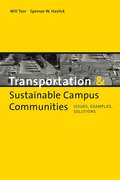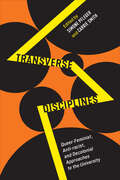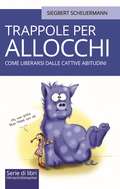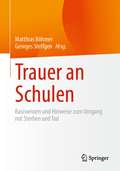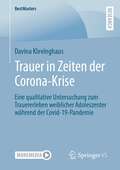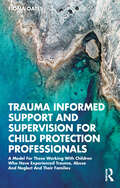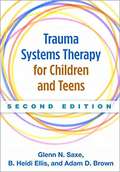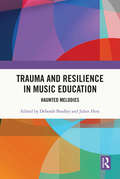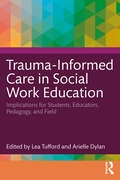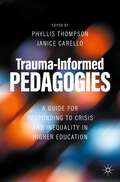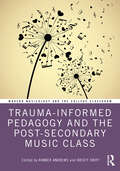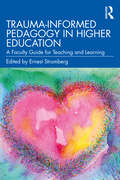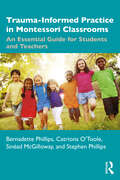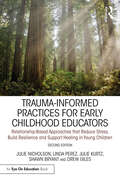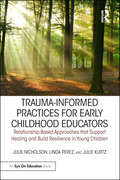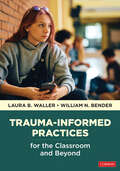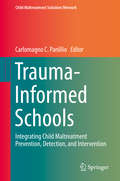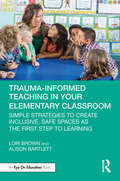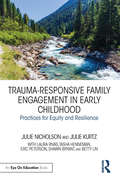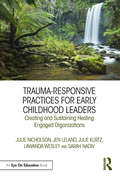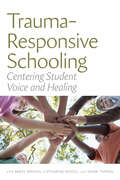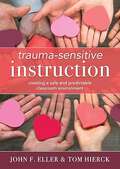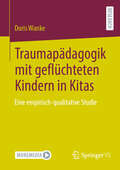- Table View
- List View
Transportation and Sustainable Campus Communities: Issues, Examples, Solutions
by Spenser Havlick Will ToorColleges and universities across North America are facing difficult questions about automobile use and transportation. Lack of land for new parking lots and the desire to preserve air quality are but a few of the factors leading institutions toward a new vision based upon expanded transit access, better bicycle and pedestrian facilities, and incentives that encourage less driving. Transportation and Sustainable Campus Communities presents a comprehensive examination of techniques available to manage transportation in campus communities. Authors Will Toor and Spenser W. Havlick give readers the understanding they need to develop alternatives to single-occupancy vehicles, and sets forth a series of case studies that show how transportation demand management programs have worked in a variety of campus communities, ranging from small towns to large cities. The case studies in Transportation and Sustainable Campus Communities highlight what works and what doesn't, as well as describing the programmatic and financial aspects involved. No other book has surveyed the topic and produced viable options for reducing the parking, pollution, land use, and traffic problems that are created by an over-reliance on automobiles by students, faculty, and staff. Transportation and Sustainable Campus Communities is a unique source of information and ideas for anyone concerned with transportation planning and related issues.
Transverse Disciplines: Queer-Feminist, Anti-racist, and Decolonial Approaches to the University
by Carrie Smith Simone PflegerFor at least a decade, university foreign language programs have been in decline throughout the English-speaking world. As programs close or are merged into large multi-language departments, disciplines such as German studies find themselves struggling to survive. Transverse Disciplines offers an overview of the current research on the humanities and the academy at large and proposes creative and courageous ideas for the university of the future. Using German studies as a case study, the book examines localized academic work in Australia, Canada, the United Kingdom, and the United States in order to model new ideas for invigorated thinking beyond disciplinary specificity, university communities, and entrenched academic practices. In essays that are theoretical, speculative, experimental, and deeply personal, contributors suggest that German studies might do better to stop trying to protect existing national and disciplinary arrangements. Instead, the discipline should embrace feminist, queer, anti-racist, and decolonial academic practices and commitments, including community-based work, research-creation, and scholar activism. Interrogating the position of researchers, teachers, and administrators inside and outside academia, Transverse Disciplines takes stock of the increasingly tenuous position of the humanities and stakes a claim for the importance of imagining new disciplinary futures within the often restrictive and harmful structures of the academy.
Trappole per allocchi: come liberarsi dalle cattive abitudini
by Siegbert ScheuermannQuesto libro vi si offre umoristicamente come uno specchio che vi consente di riconoscere le vostre abitudini e i vostri schemi usurati. Tra questi, quali riducono la qualità della vostra vita e come potete liberarvene? Ad esempio, desiderate fare esercizio fisico regolarmente, ridurre il vostro peso o smettere di fumare, ma la vostra mente trova sempre motivi per far sì che restiate ancora un po' a poltrire a letto la mattina, per considerare quel pezzettino di cioccolato un'eccezione o per rinviare l'inizio della vostra carriera di non fumatori? A quarant'anni siamo responsabili non solo del nostro peso, ma anche del nostro viso e della nostra postura. Le abitudini "nidificano" nel nostro pensiero, nelle nostre relazioni, nelle nostre espressioni facciali e nelle forme del nostro corpo. I primi passi per affrancarsi: Passo 1: un inventario nello zoo degli "animali abitudinari". Passo 2: l'analisi delle abitudini e dei modelli. Passo 3: la sostituzione delle cattive abitudini con quelle positive. Le intuizioni: 1) Il nostro cervello è spesso un'eccellente produttore di giustificazioni, che fa sì che tutto proceda secondo le solite routine. 2) Invece di lottare contro il pigrone che è in noi, dovremmo invitarlo a ballare e a volteggiarci elegantemente intorno. 3. Liberatevi dalle trappole per allocchi, dall'ingenuità, dall'incompetenza, dall'ignoranza, dall'incoerenza e dalle identificazioni dannose. Vi auguro di trascorrere ore di lettura divertenti e proficue! Il contenuto del libro è il risultato di 25 anni di lavoro di formazione in materia di comportamento e comunicazione con migliaia di partecipanti. Si basa sugli articoli pubblicati dell'autore nel Blog: "hirnschrittmacher"
Trash Truck: Trash Day (My First I Can Read)
by Max KeaneBased on the Netflix original series and inspired by a true story, this early reader is perfect for little fans of big trucks!When no one notices Trash Truck as he makes his usual rounds, he discovers that Hank is always willing to play at the end of Trash Truck's workday. Trash Truck: Trash Day is a My First I Can Read, perfect for shared reading with a child.Trash Truck is based on the real-life experiences of Max Keane, the show's creator, and his son’s love of the local garbage truck. So this book also includes a real-life photo of Max's son and his garbage truck along with a note from the author.The Netflix original animated series Trash Truck is produced by Glen Keane Productions and stars six-year-old Hank, a boy who dreams big and finds great friends through even greater adventures. Winnie the Pooh meets Goodnight, Goodnight, Construction Site in this adorable show perfect for little ones with big imaginations.
Trauer an Schulen: Basiswissen und Hinweise zum Umgang mit Sterben und Tod
by Matthias Böhmer Georges SteffgenDas Buch befasst sich mit dem Umgang mit Trauer an Schulen. Es werden Trauerreaktionen von Kindern und Jugendlichen beschrieben und Trauergründe dargestellt: Tod aufgrund einer chronischen Erkrankung, plötzliche Todesfälle wie Suizid, Unfall und schwere zielgerichtete Gewalt. Entsprechende Interventionsmaßnahmen werden vorgestellt. Abschließend wird auf die Grenzen dieser Interventionsmaßnahmen in der Schule eingegangen.
Trauer in Zeiten der Corona-Krise: Eine qualitative Untersuchung zum Trauererleben weiblicher Adoleszenter während der Covid-19-Pandemie (BestMasters)
by Davina KlevinghausDie Covid-19-Pandemie tangiert das Alltagserleben zahlreicher junger Menschen in Deutschland mitunter gravierend. Wie kann es unter diesen Umständen gelingen, die Trauer nach dem Verlust einer nahestehenden Person in ein von Unabwägbarkeiten und radikalen Veränderungen geprägtes Leben zu integrieren? Welche Belastungen und Ressourcen rücken in Anbetracht der ubiquitären Bedrohung durch das Coronavirus besonders in den Fokus? Auf diese Fragen sowie auf weitere Spezifika des Trauererlebens weiblicher Adoleszenter im Zuge der Pandemie wird - rekurrierend auf Bezugstheorien der Trauer- und Stressforschung - der Schwerpunkt der vorliegenden Arbeit gerichtet. Die geführten Interviews deuten auf erhebliche interindividuelle Unterschiede im Pandemie- und Verlusterleben sowie in den Verarbeitungsformen der eigenen Trauer hin. Zugleich lassen sich zahlreiche geteilte Erfahrungen rekonstruieren. Insofern bieten die Analysen einen grundlegenden Reflexionsanlass im Hinblick auf die Partizipationsmöglichkeiten junger Menschen, den Zugang zu trauerbezogenen Unterstützungsangeboten sowie auf den gesamtgesellschaftlichen Umgang mit Sterben, Tod und Trauer.
Trauma Informed Support and Supervision for Child Protection Professionals: A Model For Those Working With Children Who Have Experienced Trauma, Abuse And Neglect And Their Families
by Fiona OatesThis book presents a narrative approach to creating a supportive environment for health and human service practitioners who work with vulnerable children and their families—one of the most difficult and complex areas of practice. People working in these environments are routinely exposed to violence and trauma and commonly experience symptoms of traumatic stress as a result. Traditionally, human service and health care service organisations have struggled to support practitioners who experience primary and secondary trauma in either a preventative context or post exposure. Using contemporary trauma theory, this book provides a trauma-informed support and supervision framework for supervisors and managers of practitioners that recognises the uniqueness of the practice field, the diversity of practitioners who undertake the work and the diversity of contexts in which they work. It will be required reading for all human service and health professionals, including social workers, psychologists and nurses as well as teachers, counsellors and youth workers.
Trauma Systems Therapy for Children and Teens
by Adam D. Brown Glenn N. Saxe B. Heidi EllisThis highly practical book has helped thousands of clinicians make the most of limited resources to support children and families struggling with chronic, multiple adversities. Trauma systems therapy (TST) is grounded in cutting-edge research on traumatic stress and child development. It provides a roadmap for integrating individualized treatment with services at the home, school, and community levels. Effective assessment and intervention strategies are accompanied by vivid case material and reproducible worksheets and forms.
Trauma and Resilience in Music Education: Haunted Melodies
by Juliet Hess Deborah BradleyTrauma and Resilience in Music Education: Haunted Melodies considers the effects of trauma on both teachers and students in the music class- room, exploring music as a means for working through traumatic expe- riences and the role music education plays in trauma studies. The volume acknowledges the ubiquity of trauma in our society and its long-term deleterious effects while showcasing the singular ways music can serve as a support for those who struggle. In twelve contributed essays, authors examine theoretical perspectives and personal and societal traumas, providing a foundation for thinking about their implications in music education. Topics covered include: Philosophical, psychological, sociological, empirical, and narrative perspectives of trauma and resilience. How trauma-informed education practices might provide guidelines for music educators in schools and other settings Interrogations of how music and music education may be a source of trauma Distinguishing itself from other subjects—even the other arts—music may provide clues to the recovery of traumatic memory and act as a tool for releasing emotions and calming stresses. Trauma and Resilience in Music Education witnesses music’s unique abilities to reach people of all ages and empower them to process traumatic experiences, providing a vital resource for music educators and researchers.
Trauma-Informed Care in Social Work Education: Implications for Students, Educators, Pedagogy, and Field
by Lea Tufford and Arielle DylanStructured and informed by social justice orientations, this essential volume explores how trauma-informed care can be integrated in all aspects of social work education. This handbook incorporates a critical and ecologically focused lens with an emphasis on resilience, healing, and strengths-based approaches.With contributions from over 60 experts in the field of social work, education, psychology, and counselling, this comprehensive book provides current understandings of how trauma manifests in the lived experience of social work students. The book begins by introducing why trauma-informed care is needed in social work and addresses the reality of historical trauma. Each chapter views the social work student at the center of the educational journey and considers how trauma can shape experiences in various settings such as the classroom, curriculum, field, educational policy and community involvement, and support services. Chapters cover topics such as the neuroscience of trauma, poverty, disability, racism, experiential approaches, online course delivery, climate change, mindfulness, student mental wellbeing, and more.This handbook is a must-read for social work educators and field instructors who seek to prevent and lessen trauma in their social work pedagogy. It is also beneficial for undergraduate and graduate courses such as child and youth care, addiction services, and foundations of social work.
Trauma-Informed Pedagogies: A Guide for Responding to Crisis and Inequality in Higher Education
by Phyllis Thompson Janice CarelloThis book centers equity in the approach to trauma-informed practice and provides the first evidence-based guide to trauma-informed teaching and learning in higher education. The book is divided into four main parts. Part I grounds the collection in an equity approach to trauma-informed care and illustrates one or more trauma-informed principles in practice. Chapters in Part II describe trauma-informed approaches to teaching in specific disciplines. In Part III, chapters demonstrate trauma-informed approaches to teaching specific populations. Part IV focuses on instruments and strategies for assessment at the institutional, organizational, departmental, class, and employee levels. The book also includes a substantial appendix with more than a dozen evidence-based and field-tested tools to support college educators on their trauma-informed teaching journey.
Trauma-Informed Pedagogy and the Post-Secondary Music Class (Modern Musicology and the College Classroom)
by Kimber Andrews Kristy SwiftTrauma-Informed Pedagogy and the Post-Secondary Music Class explores the theory and practice of teaching and learning in a traumatized world and aims to support instructors in guiding students and walking with them through challenges that impact learning. With analysis contextualized within definitions of trauma, critical theoretical trauma studies, and clinical understandings of the causes and effects of trauma on the brain and nervous system, the book offers ways to empower faculty and students to build classrooms where it is safe enough to address the stress and trauma of learning. Bringing together a unique multidisciplinary group of contributors, this book includes perspectives from both music faculty and mental health counseling specialists.The volume engages music scholars and educators in higher education with scholarship on trauma-informed pedagogy, provides examples of how to introduce trauma-informed practices into music courses, explores how trauma-informed practices can increase both faculty and student well-being, and offers practical materials such as syllabi and assignments that instructors can implement in their classes. Reaching across disciplinary boundaries to contribute to an emerging body of research, teaching, and learning, this is a vital collection for educators across music higher education.
Trauma-Informed Pedagogy in Higher Education: A Faculty Guide for Teaching and Learning
by Ernest StrombergThis volume explores the current state of student mental health and trauma while offering theories and practice of trauma-informed teaching and learning. The interdisciplinary authors gathered in this collection discuss the roles, practices, and structures in higher education that can support the wellness and academic success of students who suffer from the effects of traumatic experiences. Chapters cover topics on teaching traumatic materials ethically and effectively, reading and writing to support recovery and healing from trauma, inclusive pedagogies responsive to systemically inflicted trauma, and developing institutional structures to support trauma-informed pedagogies. This timely and important book is designed for faculty in institutions of higher education seeking to meaningfully cultivate trauma-informed classes and learning experiences for their students.
Trauma-Informed Practice in Montessori Classrooms: An Essential Guide for Students and Teachers
by Stephen Phillips Bernadette Phillips Catriona O'Toole Sinéad McGillowayTrauma-Informed Practice in Montessori Classrooms provides important historical and contemporary evidence of the potential for Montessori schools to act as “healing” environments for children and young people. Drawing upon fascinating archival evidence and contemporary trauma theory, it shows how authentic Montessori schools already have the infrastructure to promote and embed trauma-informed practice (TIP) in their classrooms.The book provides cutting-edge, interdisciplinary knowledge on trauma and highlights its potential to negatively impact the emotional, social, and cognitive functioning of children and young people. It explains clearly and precisely the principles of TIP and how historically, these were woven into the fabric of the early Montessori schools, resulting in their reputation as “Case della Salute” or “Health Homes.” The book shows how this almost forgotten “healing” element of Montessori schools can be revived, harnessed, and promoted in ways that would benefit the overall health and well-being of children and young people.This timely book is highly informative, hugely practical, and reader-friendly. It includes features such as boxed chapter objectives, learner outcomes, vignettes, chapter summaries, and questions for group discussion. It provides an invaluable guide for Montessori teachers and students, for home educators using the Montessori approach, and for non-Montessori educators and parents.
Trauma-Informed Practices for Early Childhood Educators: Relationship-Based Approaches that Reduce Stress, Build Resilience and Support Healing in Young Children
by Julie Nicholson Linda Perez Julie Kurtz Shawn Bryant Drew GilesThis second edition of Trauma-Informed Practices for Early Childhood Educators continues to guide childcare providers and early educators working with infants, toddlers, preschoolers and early elementary-aged children to understand trauma as well as its impact on young children’s brains, behavior, learning and development. The book covers a range of trauma-responsive teaching strategies that readers can use to create strength-based environments that support children’s health, healing and resiliency. Updates include a greater emphasis on resilience and collaborating with mental health specialists, new chapters on developing children’s body awareness/sensory literacy and pathways to regulation that reduce stress through breathing techniques and mindful movement, as well as new vignettes and case studies to use in workshops or professional development. Supervisors and coaches will learn a range of powerful trauma-responsive practices that they can use to support workforce development and enhance their quality improvement initiatives.
Trauma-Informed Practices for Early Childhood Educators: Relationship-Based Approaches that Support Healing and Build Resilience in Young Children
by Julie Nicholson Linda Perez Julie KurtzTrauma-Informed Practices for Early Childhood Educators guides child care providers and early educators working with infants, toddlers, preschoolers, and early elementary aged children to understand trauma as well as its impact on young children’s brains, behavior, learning, and development. The book introduces a range of trauma-informed teaching and family engagement strategies that readers can use in their early childhood programs to create strength-based environments that support children’s health, healing, and resiliency. Supervisors and coaches will learn a range of powerful trauma-informed practices that they can use to support workforce development and enhance their quality improvement initiatives.
Trauma-Informed Practices for the Classroom and Beyond
by William N. Bender Laura B. WallerFind the right strategies and tools to support students who experience trauma Studies show that 46-75% of children experience trauma, often resulting in challenging behavior, depression, and anxiety as well as long-term physical and mental health issues. Today’s educators, counselors, and clinicians need the right strategies to help. Written by experts with years of experience working with children and teens exposed to adverse childhood experiences (ACEs), Trauma-Informed Practices for the Classroom and Beyond describes the most effective tools available and walks you through how to implement them with compassion and fidelity. Inside, you’ll find Detailed and easy-to-implement interventions that alleviate the effects of trauma, including mindfulness, journaling, restorative justice, and more Trauma-informed practices to use with all students, regardless of their age or the duration or frequency of their trauma exposure Ways educators can prepare their classrooms and schools to support students who experience ACEs This how-to guide and its companion website with discussion points, recommended videos, and additional resources equips you with evidence-based techniques and instructions to support children and teens with ACEs and enhances your practice to better serve the students who need our help most.
Trauma-Informed Practices for the Classroom and Beyond
by William N. Bender Laura B. WallerFind the right strategies and tools to support students who experience trauma Studies show that 46-75% of children experience trauma, often resulting in challenging behavior, depression, and anxiety as well as long-term physical and mental health issues. Today’s educators, counselors, and clinicians need the right strategies to help. Written by experts with years of experience working with children and teens exposed to adverse childhood experiences (ACEs), Trauma-Informed Practices for the Classroom and Beyond describes the most effective tools available and walks you through how to implement them with compassion and fidelity. Inside, you’ll find Detailed and easy-to-implement interventions that alleviate the effects of trauma, including mindfulness, journaling, restorative justice, and more Trauma-informed practices to use with all students, regardless of their age or the duration or frequency of their trauma exposure Ways educators can prepare their classrooms and schools to support students who experience ACEs This how-to guide and its companion website with discussion points, recommended videos, and additional resources equips you with evidence-based techniques and instructions to support children and teens with ACEs and enhances your practice to better serve the students who need our help most.
Trauma-Informed Schools: Integrating Child Maltreatment Prevention, Detection, and Intervention (Child Maltreatment Solutions Network)
by Carlomagno C. PanlilioThis book provides an interdisciplinary framework for school intervention into child and adolescent maltreatment, highlighting the unique potential for schools to identify and mitigate the long-term impacts of childhood trauma on children’s educational well-being. Contributors evaluate recent efforts to incorporate trauma-informed approaches into schools, including strategic planning by administrators, staff training, prevention programming, liaising with local youth service agencies, and trauma-sensitive intervention with affected students.Among the topics discussed:• The developmental impact of trauma• The role of schools and teachers in supporting student mental health• Prevention programming to prevent child and adolescent sexual abuse• Education policies to support students with traumatic histories• Responding to childhood trauma at both macro and microsystem levelsTrauma-Informed Schools: Integrating Child Maltreatment Prevention, Detection, and Intervention is a valuable resource for child maltreatment researchers, educational and school psychologists, school social workers, students in early childhood and K-12 education, and education policy makers at all levels of government. It offers the necessary guidelines and insights to facilitate better learning for students who have experienced trauma, aiming to improve student well-being both inside and outside the classroom.
Trauma-Informed Teaching in Your Elementary Classroom: Simple Strategies to Create Inclusive, Safe Spaces as the First Step to Learning
by Alison Bartlett Lori BrownResearch has proven that childhood trauma affects school engagement and success while at the same time recognizing that the majority of students have experienced it. This book offers simple strategies, based on evidence-based studies, that elementary educators can use to effectively recognize trauma, teach resilience, and support their students in being ready to learn. The book covers all the tenets of trauma-informed teaching, including understanding the effects of trauma, creating safety and predictability, fostering healthy attachments, and modeling resilience as part of social emotional learning, all of which are framed within cultural humility and competence. Designed for all teachers, professionals, and school administrators working with elementary students, this practical guide is key reading for creating a safe classroom and school environment that is inclusive of all learners and conducive for learning.
Trauma-Responsive Family Engagement in Early Childhood: Practices for Equity and Resilience
by Julie Nicholson Julie KurtzDesigned for all professionals working with parents and families of young children, this practical guide offers comprehensive resources for building trauma-responsive family engagement in your school or program. Throughout this book, you'll find: Evidence-based practices that promote trauma-response family engagement. Exercises and tools for identifying the strengths and learning edges within your program, school, or agency. Vignettes from people and programs striving to create trusting, asset-focused partnerships with families that improve equity and promote culturally responsive practices. Reflective inquiry questions and sample conversations to help you examine your own practices. With concrete examples and easy-to-implement strategies, this critical book helps readers put theory into practice while providing essential support for individuals and groups both new to and experienced with trauma-responsive practices in early childhood.
Trauma-Responsive Practices for Early Childhood Leaders: Creating and Sustaining Healing Engaged Organizations
by Julie Nicholson Julie Kurtz LaWanda Wesley Jen Leland Sarah NadivSpecifically designed for administrators and leaders working in early childhood education, this practical guide offers comprehensive resources for creating trauma-responsive organizations and systems. Throughout this book, you'll find: Exercises and tools for identifying the strengths and areas in need of change within your program, school or agency. Reflection questions and sample conversations. Rich vignettes from programs already striving to create healthier, trauma-responsive environments. The guidance in this book is explained with simple, easy-to-implement strategies you can apply immediately to your own practice and is accompanied by brainstorming questions to help educational leaders both new to and experienced with trauma-informed practices succeed.
Trauma-Responsive Schooling: Centering Student Voice and Healing
by Lyn Mikel Brown Catharine Biddle Mark TappanTrauma-Responsive Schooling outlines a novel approach to transforming American schools through student-centered, trauma-informed practices.The book chronicles the use of an innovative educational model, Trauma-Responsive Equitable Education (TREE), as part of a multiyear research project in two elementary schools in rural Maine. In this model, Lyn Mikel Brown, Catharine Biddle, and Mark Tappan endorse whole-school change, encouraging educators to upend traditional classroom power dynamics by listening foremost to student voices, validating student experiences, and promoting student agency.The authors provide complex real-life examples of student involvement in the creation and implementation of trauma-responsive and equitable practices. Their work offers readers concrete, actionable examples of such practices, which include supporting the whole child by promoting social and emotional learning (SEL) as well as academic achievement; providing access to basic needs such as food, clothing, and health care; and meeting the instructional requirements of dual-language learners.Many rural schools in the United States experience low student achievement and high absenteeism rates as their geographically isolated communities struggle with poverty, substance abuse, and other significant stressors. Yet, as the authors demonstrate, supportive learning environments, even in under-resourced rural schools, are able to mitigate adversity, stress, and trauma—and thus promote healing.This heartening work illustrates that, when educators and school leaders put student needs and interests at the core of school life, long-lasting change for all students is possible.
Trauma-Sensitive Instruction: Creating a Safe and Predictable Classroom Environment
by John F. Eller & Tom HierckThe impact of trauma on learning can be significant and long lasting. Learn how you can confidently and meaningfully support your trauma-impacted students and foster trauma-informed schools with this accessible resource. The authors draw from their personal and professional experiences with trauma, mental health, and school culture to provide real insight into what you can do now to help learners build resilience, cope with adverse situations, and achieve at high levels.
Traumapädagogik mit geflüchteten Kindern in Kitas: Eine empirisch-qualitative Studie
by Doris WankeDoris Wanke führt in diesem Buch eine Analyse über Traumpädagogik in Kitas am Beispiel von geflüchteten Kindern durch. Innerhalb dieser empirischen qualitativen Studie wurden einerseits frühpädagogische Fachkräfte aus Kindertageseinrichtungen mit geflüchteten Kindern im Alter zwischen drei und sieben Jahren mittels Gruppendiskussionen zur Traumapädagogik befragt. Andererseits erfolgte die Erhebung mittels leitfadengestützen Expert*inneninterviews von Traumaexpert*innen, die zu Traumapädagogik Fort- und Weiterbildungen anbieten. Untersucht werden u. a. die (trauma-)pädagogischen Wissensstände der Fachkräfte und in welchen Bereichen Handlungs-, Fortbildungs-, Schulungs- und Unterstützungsbedarf gesehen wird. Entstanden ist ein eigenes berufsbezogenen früh- und traumapädagogisches Handlungs-, Wissens- und Kompetenzmodell.
